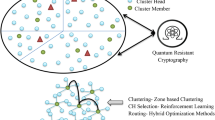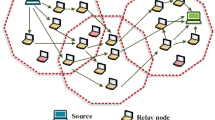Abstract
The ever-changing topology in mobile ad hoc networks (MANETs) makes routing a formidable obstacle. The infrastructure-independent capabilities of MANET ensure the temporary communications linkages, but the lack of a good centralized monitoring method makes routing in MANETs a severe trust and safety concern. As a result, this study presents a new energy-and trust-aware protocol for routing that depends on the suggested as well as enabled by Deep Reinforcements Learning. The best route choice is being carried out by the suggested Dolphin Cat Optimizer according to the modelled objective function that takes into account trust criteria, including current trust, historic trust, both direct and indirect trust, delay, distance, and connection lifespan. Combining the advantages of both the Dolphins Echolocation as well as the Cat Swarm Optimization algorithms, the Dolphin Cat Optimizer is able to achieve quicker worldwide cooperation. The suggested protocol for routing achieved 0.6531, 0.0107, 0.3267, as well as 0.9898 in absence of network assaults, as well as 0.7693, 0.0112, 0.3605, as well as 0.9961 in the event of network attacks, according to the modeling involving 75 nodes.









Similar content being viewed by others
Data availability
Data sharing not applicable to this article as no datasets were generated or analyzed during the current study.
References
Sun, D., Zhang, L., Jin, K., Ling, J., & Zheng, X. (2023). An intrusion detection method based on hybrid machine learning and neural network in the industrial control field. Applied Sciences, 13, 10455.
Karim, A., Shahroz, M., Mustofa, K., Belhaouari, S. B., & Joga, S. R. (2023). Phishing detection system through hybrid machine learning based on URL. IEEE Access, 11, 36805–36822.
Shibl, M. M., Ismail, L. S., & Massoud, A. M. (2023). An intelligent two-stage energy dispatch management system for hybrid power plants: Impact of machine learning deployment. IEEE Access, 11, 13091–13102.
Kumar, D., Chauhan, Y. K., Pandey, A. S., Srivastava, A. K., Kumar, V., Alsaif, F., Elavarasan, R. M., Islam, M. R., Kannadasan, R., & Alsharif, M. H. (2023). A novel hybrid MPPT approach for solar PV systems using particle-swarm-optimization-trained machine learning and flying squirrel search optimization. Sustainability, 15, 5575.
Srivastava, A. K., Pandey, A. S., Abou Houran, M., Kumar, V., Kumar, D., Tripathi, S. M., Gangatharan, S., & Elavarasan, R. M. (2023). A day-ahead short-term load forecasting using M5P machine learning algorithm along with elitist genetic algorithm (EGA) and random forest-based hybrid feature selection. Energies, 16, 867.
Meenakshi, K., Revathi, M., Harsha, S. S., Tamilarasi, K., Shanthi, T. S., Sugumar, D., & Rajaram, A. (2024). Hybrid machine learning approach for trust evaluation to secure MANET from routing attacks. Journal of Intelligent & Fuzzy Systems, 46, 1–17.
Sugumaran, V. R., & Rajaram, A. (2023). Lightweight blockchain-assisted intrusion detection system in energy efficient MANETs. Journal of Intelligent & Fuzzy Systems, 45, 1–16.
Cha, G., Hong, W., & Kim, Y. (2023). Performance improvement of machine learning model using autoencoder to predict demolition waste generation rate. Sustainability, 15, 3691.
Rahman, M., Chowdhury, S., Shorfuzzaman, M., Hossain, M. K., & Hammoudeh, M. (2023). Peer-to-peer power energy trading in blockchain using efficient machine learning model. Sustainability, 15, 13640.
Ahmim, A., Maazouzi, F., Ahmim, M., Namane, S., & Dhaou, I. B. (2023). Distributed denial of service attack detection for the internet of things using hybrid deep learning model. IEEE Access, 11, 119862–119875.
Kumer, S. V., Gogu, L. B., Ellappan, M., Maloji, S., Natarajan, B., Sambasivam, G., & Tyagi, V. B. (2023). Track and noise separation based on the universal codebook and enhanced speech recognition using hybrid deep learning method. IEEE Access, 11, 120707–120720.
Martinho, A. D., Hippert, H. S., & Goliatt, L. (2023). Short-term streamflow modeling using data-intelligence evolutionary machine learning models. Scientific Reports. https://doi.org/10.1038/s41598-023-41113-5
Ilakkiya, N., & Rajaram, A. (2023). Blockchain-assisted secure routing protocol for cluster-based mobile-ad hoc networks. International Journal of Computers Communications & Control. https://doi.org/10.15837/ijccc.2023.2.5144
Masood, A., Hameed, M. M., Srivastava, A., Pham, Q. B., Ahmad, K., Razali, S. F., & Baowidan, S. A. (2023). Improving PM2.5 prediction in New Delhi using a hybrid extreme learning machine coupled with snake optimization algorithm. Scientific Reports, 13, 21057.
Sharmin, S., Ahammad, T., Talukder, M., & Ghose, P. (2023). A hybrid dependable deep feature extraction and ensemble-based machine learning approach for breast cancer detection. IEEE Access, 11, 87694–87708.
Ali, J., & Khan, M. F. (2023). A trust-based secure parking allocation for IoT-enabled sustainable smart cities. Sustainability, 15, 6916.
Jafari, S., Byun, Y. C., & Ko, S. (2023). A novel approach for predicting remaining useful life and capacity fade in lithium-ion batteries using hybrid machine learning. IEEE Access, 11, 131950–131963.
Asghar, Z., Hafeez, K., Sabir, D., Ijaz, B., Bukhari, S. S., & Ro, J. (2023). Reclaim: Renewable energy based demand-side management using machine learning models. IEEE Access, 11, 3846–3857.
Chaparala, A., Jain, P. K., Karamti, H., & Karamti, W. (2023). Monitor the strength status of buildings using hybrid machine learning technique. IEEE Access, 11, 26441–26458.
Kennedy, L., Sandhu, J.K., Harper, M., & Čuperlović-Culf, M. (2023). Mapping relationships between glutathione and SLC25 transporters in cancers using hybrid machine learning models. bioRxiv.
Nur, A. S., Kim, Y. J., Lee, J., & Lee, C. (2023). Spatial prediction of wildfire susceptibility using hybrid machine learning models based on support vector regression in sydney Australia. Remote Sensing, 15, 760.
Lee, M., Kunzi, M., Neurohr, G.E., Lee, S.S., & Park, Y. (2023). Hybrid machine-learning framework for volumetric segmentation and quantification of vacuoles in individual unlabeled yeast cells using holotomography. bioRxiv.
Mallampati, B., Ishaq, A., Rustam, F., Kuthala, V., Alfarhood, S., & Ashraf, I. (2023). Brain tumor detection using 3D-UNet segmentation features and hybrid machine learning model. IEEE Access, 11, 135020–135034.
Almasoudi, F. M. (2023). Enhancing power grid resilience through real-time fault detection and remediation using advanced hybrid machine learning models. Sustainability, 15, 8348.
Zafar, A., Che, Y. B., Ahmed, M., Sarfraz, M., Ahmad, A., & Alibakhshikenari, M. (2023). Enhancing power generation forecasting in smart grids using hybrid autoencoder long short-term memory machine learning model. IEEE Access, 11, 118521–118537.
Razali, N. A., Malizan, N. A., Hasbullah, N. A., Wook, M., Zainuddin, N. M., Ishak, K. K., Ramli, S., & Sukardi, S. (2023). Political security threat prediction framework using hybrid lexicon-based approach and machine learning technique. IEEE Access, 11, 17151–17164.
Liu, Y., Li, N., Qi, J., Xu, G., Zhao, J., Wang, N., Huang, X., Jiang, W., Justet, A., Adams, T.S., Homer, R., Amei, A., Rosas, I.O., Kaminski, N., Wang, Z., & Yan, X. (2023). A hybrid machine learning and regression method for cell type deconvolution of spatial barcoding-based transcriptomic data. bioRxiv.
Tang, W., Brown, K., Mitchell, D., Blanche, J., & Flynn, D. (2023). Subsea power cable health management using machine learning analysis of low-frequency wide-band sonar data. Energies, 16, 6172.
Liu, X., Zhang, X., & Baziar, A. (2023). Hybrid machine learning and modified teaching learning-based english optimization algorithm for smart city communication. Sustainability, 15, 11535.
Khalid, R., Ullah, A., Khan, A., Khan, A., & Inayat, M. H. (2023). Comparison of standalone and hybrid machine learning models for prediction of critical heat flux in vertical tubes. Energies, 16, 3182.
Ali, S. S., Kaur, R., Persis, D. J., Saha, R., Pattusamy, M., & Sreedharan, V. R. (2023). Developing a hybrid evaluation approach for the low carbon performance on sustainable manufacturing environment. Annals of Operations Research. https://doi.org/10.1007/s10479-020-03877-1
Ali, S. S., Ersöz, F., Kaur, R., Altaf, B., & Weber, G. W. (2021). A quantitative analysis of low carbon performance in industrial sectors of developing world. Journal of cleaner production, 284, 125268.
Lotfi, R., Gholamrezaei, A., Kadłubek, M., Afshar, M., Ali, S. S., & Kheiri, K. (2022). A robust and resilience machine learning for forecasting agri-food production. Scientific Reports, 12(1), 21787.
Ranjbarzadeh, R., Dorosti, S., Ghoushchi, S. J., Caputo, A., Tirkolaee, E. B., Ali, S. S., & Bendechache, M. (2023). Breast tumor localization and segmentation using machine learning techniques: Overview of datasets, findings, and methods. Computers in Biology and Medicine, 152, 106443.
Ranjbarzadeh, R., Jafarzadeh Ghoushchi, S., Tataei Sarshar, N., Tirkolaee, E. B., Ali, S. S., Kumar, T., & Bendechache, M. (2023). ME-CCNN: Multi-encoded images and a cascade convolutional neural network for breast tumor segmentation and recognition. Artificial Intelligence Review, 56(9), 10099–10136.
Lotfi, R., Hazrati, H., Ali, S. S., Sharifmousavi, S. M., Khanbaba, A., & Amra, M. (2023). Antifragile, sustainable and agile healthcare waste chain network design by considering blockchain, resiliency, robustness and risk. Central European Journal of Operations Research. https://doi.org/10.1007/s10100-023-00874-0
Lotfi, R., Mardani, N., Ali, S. S., Pahlevan, S. M., & Davoodi, S. M. R. (2024). A robust and risk-averse medical waste chain network design by considering viability requirements. RAIRO-Operations Research, 58(2), 1473–1497.
Lotfi, R., MohajerAnsari, P., Nevisi, M. M. S., Afshar, M., Davoodi, S. M. R., & Ali, S. S. (2024). A viable supply chain by considering vendor-managed-inventory with a consignment stock policy and learning approach. Results in Engineering, 21, 101609.
Lotfi, R., Hazrati, R., Aghakhani, S., Afshar, M., Amra, M., & Ali, S. S. (2024). A data-driven robust optimization in viable supply chain network design by considering open innovation and blockchain technology. Journal of Cleaner Production, 436, 140369.
Lotfi, R., Khanbaba, A., Ali, S. S., Afshar, M., Mehrjardi, M. S., & Omidi, S. (2024). Net-zero, resilience, and agile closed-loop supply chain network design considering robustness and renewable energy. Environmental Science and Pollution Research. https://doi.org/10.1007/s11356-024-32661-y
Acknowledgements
There is no acknowledgement involved in this work.
Funding
No funding is involved in this work.
Author information
Authors and Affiliations
Contributions
All authors are contributed equally to this work.
Corresponding author
Ethics declarations
Conflict of interest
Conflict of Interest is not applicable in this work.
Ethics approval and consent to participate
No participation of humans takes place in this implementation process.
Human and animal rights
No violation of Human and Animal Rights is involved.
Additional information
Publisher's Note
Springer Nature remains neutral with regard to jurisdictional claims in published maps and institutional affiliations.
Rights and permissions
Springer Nature or its licensor (e.g. a society or other partner) holds exclusive rights to this article under a publishing agreement with the author(s) or other rightsholder(s); author self-archiving of the accepted manuscript version of this article is solely governed by the terms of such publishing agreement and applicable law.
About this article
Cite this article
Arulselvan, G., Rajaram, A. Routing attacks detection in MANET using trust management enabled hybrid machine learning. Wireless Netw 31, 1481–1495 (2025). https://doi.org/10.1007/s11276-024-03846-7
Published:
Issue Date:
DOI: https://doi.org/10.1007/s11276-024-03846-7




